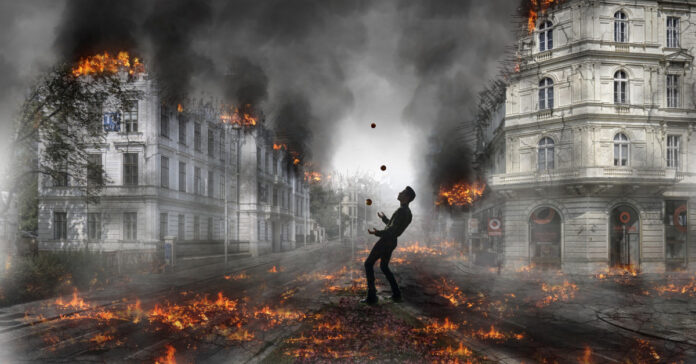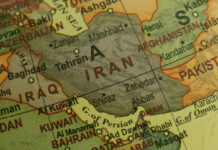I read an article that referred to “the confluence of events” around the world, as if the war in Ukraine, threats to Taiwan, and the possibility of a war between Iran and Israel were merging into one big crisis, much like three separate rivers would merge into one larger body of water. I think people conclude this because Russia, China, and Iran are considered allies.
Unfortunately, this is no confluence, or blending, of wars. These are three separate and distinct issues that the U.S. and its allies might have to address at the same time. They may all involve a conflict, weapons and war, but they are in different theaters, against different enemies, and will no doubt require different responses. Rather than speak of a confluence, we should be talking about juggling.
During World War II, there were multiple fronts and multiple enemies. The battle fought in North Africa against Rommel’s Panzer Division required different tactics, weapons and forces than the battle at Midway. Although both were part of WWII, there was no “confluence of events” that brought them together.
If we see war with China and/or a war in the Middle East, they may well be part of what we one day refer to as World War III, but they will remain different: a land war in Europe, a naval battle over Taiwan’s independence, and what is likely to be large-scale air and missile attacks between Iran and Israel. Three distinct operations, using independent tactics, against different enemies.
Juggling
The U.S. and NATO are having a hard enough time keeping a single ball in the air with the Russian invasion of Ukraine. In addition to needing to skirt a red line that might trigger Putin into using nuclear weapons, we must balance the following interests and concerns:
- Ukraine keeps insisting it needs more and better weapons, and there are some differences in opinion about this among NATO.
- The Baltic States fear they may be next on the invasion list and, like Poland, are pushing for more NATO weapons and a greater NATO presence in their countries. Other countries, further south and therefore insulated from a Russian attack, are growing less enthusiastic about supporting the war.
- As stocks of ammunition and weapons run low and consumption outstrips production, concerns grow among allies that the war may strip their armories, leaving them unable to defend themselves if the war spills out beyond Ukraine’s borders.
- Because of its history of neutrality, Switzerland does not want other countries to donate Swiss weapons and ammunition to Ukraine. (The Swiss have a long history of making fine weapons. Sig Sauer, for example, is a Swiss company.)
- Finland and Sweden want to join NATO, but Turkey is preventing them from doing so.
- Economic sanctions against Russia seem to have less impact than expected. Third parties are buying their oil, disguising or obscuring its origin, and reselling it.
- China may soon supply Russia with weapons.
- The U.S. is suspected of having blown up the Nord Stream pipelines. While this may have been directed against Russia, it also did great harm to the economy of Europe, especially Germany, an issue that has not been addressed.
If we add in another enemy and a separate battle, that list will more than double and keeping that many balls in the air will be enormously more difficult.
On the Home Front
While foreign policy is distracting the White House, there is a growing list of problems here at home. The recent loss by Chicago Mayor Lori Lightfoot may mark a turning point in the Defund the Police movement. If Democratic cities are voting against rising crime and homelessness, law and order Republicans may stand a greater chance in statewide and national elections.
The poor performance of several gay, transgender, or cross-dressing officials who the administration hired to send a message rather than because they were competent is making the Biden Administrating look increasingly incompetent here at home. Common problems like train derailments are becoming national crises due to fumbles and self-inflected wounds. Biden officials stealing airline baggage doesn’t help their cause. Repetitive losses in court are making it clear that President Biden ran on promises he cannot keep and many of his policies are, in fact, unconstitutional. Other policies, like the open border, are just plain dumb and becoming unpopular.
While the administration focuses its attention overseas, the pendulum at home is swinging away from ESG and wokeness and towards concerns about inflation, the economy, the fentanyl crisis, and other issues that the administration is ignoring or making worse. I predict this will catch the Democrats by surprise. Meanwhile, a recession will may surprise and hurt many voters.
A Solid Foundation
As preppers, we may feel the need to juggle our priorities in response to both the global and domestic situation. This grows in difficulty when the threats change. A year ago, food shortages were the problem; now you rarely hear about it, outside of eggs. We never know which issue might jump to the forefront, from Chinese spy balloons to Russian submarines with nuclear torpedoes.
My advice is to concentrate on the preparedness basics, which will give you a solid foundation. If you focus on the big three (food, shelter and water) and then the next three (self-defense, first aid/medical, and communications), you will be well prepared for a multitude of emergencies. Get these basics down and then look at the world around you and shift some attention from general preps to specific ones.
For example, if you fear food shortages, then you should stockpile more food. If you fear nuclear war, then buy some potassium iodate, look for a fallout shelter, and get a Geiger counter. If you fear a forest fire, then take steps to protect your property. But have the basics down first and you will be on a solid footing for any disaster.
Pick Your Battles
As a child growing up in San Diego during WWII, my mother worried about air raids every night when she lay in bed. My advice is not ne that person; don’t worry about things you cannot control. Focus on where you can be effective and have an impact. (In her case, this might have been making sure their blackout curtains were effective or sleeping in the basement.)
You and I can’t stop Russia from using a nuclear weapon or Iran from building one, but we can make sure we are as prepared as possible for these and other disasters. We can’t stop crime, but we can build a layered defense and arm ourselves. We can’t stop drug users from shooting up on the street, but we can move to areas where our kids don’t have to see that every day and think it is acceptable behavior.
Pick your battles. Control what you can and let go of the rest. If you have a hard time with that, then take a deep breath, say the serenity prayer, and enjoy what passes for normal because as bad as things are, they could be worse.







